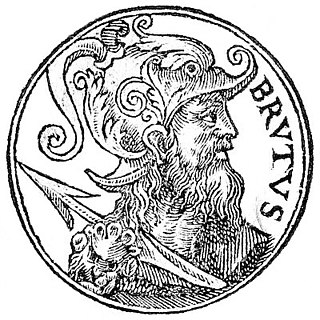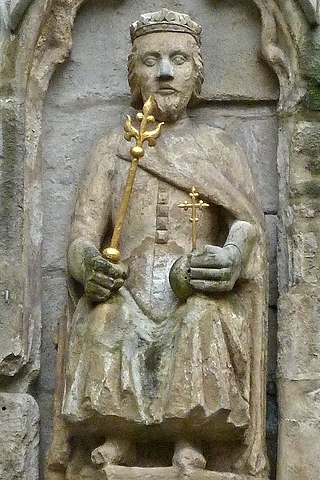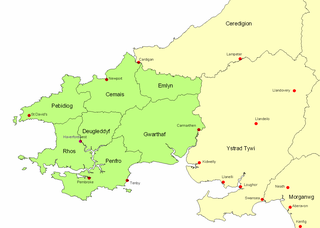Related Research Articles

Uther Pendragon (Brittonic), also known as King Uther, was a legendary King of the Britons and father of King Arthur.

Brutus, also called Brute of Troy, is a mythical British king. He is described as a legendary descendant of the Trojan hero Aeneas, known in medieval British legend as the eponymous founder and first king of Britain. This legend first appears in the Historia Brittonum, an anonymous 9th-century historical compilation to which commentary was added by Nennius, but is best known from the account given by the 12th-century chronicler Geoffrey of Monmouth in his Historia Regum Britanniae.

Lud, according to Geoffrey of Monmouth's pseudohistorical History of the Kings of Britain and related medieval texts, was a king of Britain in pre-Roman times who founded London and was buried at Ludgate. He was the eldest son of Geoffrey's King Heli, and succeeded his father to the throne. He was succeeded, in turn, by his brother Cassibelanus. Lud may be connected with the Welsh mythological figure Lludd Llaw Eraint, earlier Nudd Llaw Eraint, cognate with the Irish Nuada Airgetlám, a king of the Tuatha Dé Danann, and the Brittonic god Nodens. However, he was a separate figure in Welsh tradition and is usually treated as such.

Cadwaladr ap Cadwallon was king of Gwynedd in Wales from around 655 to 664 or 682. He died in one of two devastating plagues that happened in 664 and in 682. Little else is known of his reign.

Beli Mawr was an ancestor figure in Middle Welsh literature and genealogies. He is the father of Cassivellaunus, Arianrhod, Lludd Llaw Eraint, Llefelys, and Afallach. In certain medieval genealogies, he is listed as the son or husband of Anna, cousin of Mary, mother of Jesus. According to the Welsh Triads, Beli and Dôn were the parents of Arianrhod, but the mother of Beli's other children—and the father of Dôn's other children—is not mentioned in the medieval Welsh literature. Several royal lines in medieval Wales traced their ancestry to Beli. The Mabinogi names Penarddun as a daughter of Beli Mawr, but the genealogy is confused; it is possible she was meant to be his sister rather than daughter.
Maddan was a legendary king of the Britons as accounted by Geoffrey of Monmouth. He came to power in 1100BC. He was the son of King Locrinus and Queen Gwendolen, who both ruled Britain separately.

Leir was a legendary king of the Britons whose story was recounted by Geoffrey of Monmouth in his pseudohistorical 12th-century History of the Kings of Britain. According to Geoffrey's genealogy of the British dynasty, Leir reigned around the 8th century BC, around the time of the founding of Rome. The story was modified and retold by William Shakespeare in his Jacobean tragedy King Lear.
Rivallo was a legendary king of the Britons as accounted by Geoffrey of Monmouth. He came to power in 817BC.
Dyfnwal Moelmud was accounted as an early king and lawmaker among the Welsh, credited with the codification of their standard units of measure. He also figures as a legendary king of the Britons in Geoffrey of Monmouth's pseudohistorical History of the Kings of the Britons.

Belinus was a legendary king of the Britons, as recounted by Geoffrey of Monmouth. He was the son of Dunvallo Molmutius and brother of Brennius and came to power in 390 BC. He was probably named after the ancient god Belenus.
Archgallo was a legendary king of the Britons as recounted by Geoffrey of Monmouth. He ruled from 339BC. He was the second son of King Morvidus and brother of Gorbonianus.

Historia regum Britanniae, originally called De gestis Britonum, is a fictitious historical account of British history, written around 1136 by Geoffrey of Monmouth. It chronicles the lives of the kings of the Britons over the course of two thousand years, beginning with the Trojans founding the British nation and continuing until the Anglo-Saxons assumed control of much of Britain around the 7th century. It is one of the central pieces of the Matter of Britain.
Arvirargus or Arviragus was a legendary British king of the 1st century AD, possibly based upon a real person. A shadowy historical Arviragus is known only from a cryptic reference in a satirical poem by Juvenal, in which a giant turbot presented to the Roman emperor Domitian is said to be an omen that "you will capture some king, or Arviragus will fall from his British chariot-pole".
Marius was a legendary king of the Britons during the time of the Roman occupation of Britain, as recounted in Geoffrey of Monmouth's pseudohistorical Historia Regum Britanniae. He came to power in 96AD. He was the son of King Arvirargus and ruled following his father's death.

Dionotus was a legendary king of Cornwall in Geoffrey of Monmouth's Historia regum Britanniae, an account of the rulers of Britain based on ancient Welsh sources and disputed by many historians. Dionotus succeeding his brother Caradocus, and was regent of Britain during the campaigns in Gaul of Emperor Magnus Maximus. The curious thing about this king is that the Welsh chronicles, which parallel most of Geoffrey of Monmouth's book, do not mention this king by name. However, Geoffrey uses Latin versions of Welsh names so he could be referring to Dynod, duke of Cornwall, or Anwn Dynod, Maximus's own son.
Gracianus Municeps was a legendary King of the Britons, according to Geoffrey of Monmouth's Historia regum Britanniae, a largely fictional account of British history. "Municeps" translates to "freedman", meaning this individual was Gracianus the freedman. After the death of Roman Emperor Magnus Maximus, Gracianus seized the throne of Britain upon receiving word of Maximus's demise, by whose orders he had been sent to defend the attacked island while Maximus was campaigning on the continent.
Vortimer, also known as Saint Vortimer, is a figure in British tradition, a son of the 5th-century Britonnic ruler Vortigern. He is remembered for his fierce opposition to his father's Saxon allies. In Geoffrey of Monmouth's Historia Regum Britanniae, he overthrows his father and reigns as King of Britain for a brief period before his death restores Vortigern to power.

Vortiporius or Vortipor was a king of Dyfed in the early to mid-6th century. He ruled over an area approximately corresponding to modern Pembrokeshire, and Carmarthenshire, Wales. Records from this era are scant, and virtually nothing is known of him or his kingdom. The only contemporary information about Vortiporius comes from the Welsh ecclesiastic Gildas, in a highly allegorical condemnation from his De Excidio et Conquestu Britanniae. At the time the work was written, Gildas says that Vortiporius was king of Dyfed, that he was grey with age, that his wife had died, and that he had at least one daughter.
Lucius Tiberius is a Western Roman procurator or emperor from Arthurian legend in which he is killed in a war against King Arthur. First appearing in Geoffrey of Monmouth's pseudo-historical work Historia Regum Britanniae, Lucius also features in later, particularly English literature such as the Alliterative Morte Arthure and Thomas Malory's Le Morte d'Arthur. The motif of a Roman Emperor defeated by Arthur is found in the Old French literature as well, notably in the Vulgate Cycle.
References
- 1 2 3 4 Geoffrey of Monmouth (1987). The History of the Kings of Britain. Translated by Thorpe, Lewis. Penguin Books. pp. 100–101. ISBN 9780140441703.
- 1 2 3 Russell, Miles (2017). "Gurguit Barbtruc". Arthur and the Kings of Britain: The Historical Truth Behind the Myths. Amberley Publishing. ISBN 9781445662756.